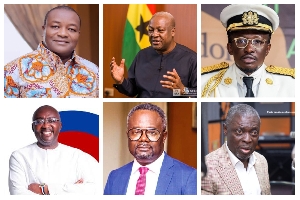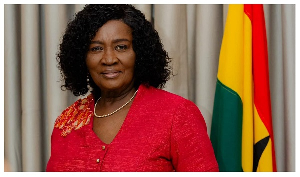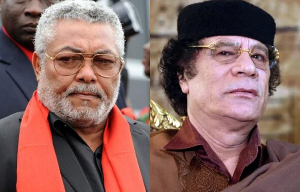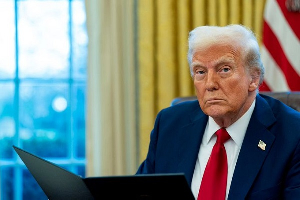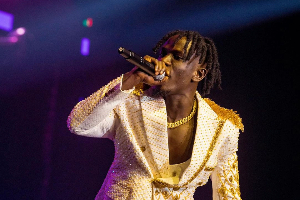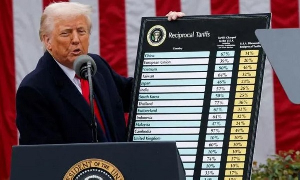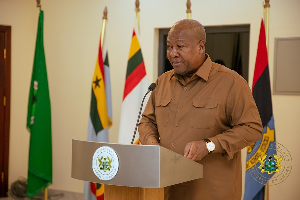In December 2024, Ghanaians will go to the polls to elect a new president, a president who would be expected to shape the future of the nation. It seems there will be no formal presidential debates, consequently, whenever you have the opportunity to talk to any of the aspirants, you should ask them the following questions:
First, do you consider the construction of the Cathedral started by President Akufo Addo necessary for Ghana? If yes, tell us the significance of the Cathedral to the economic development of the country.
How much money would you devote to the completion of the Cathedral?
How will the Cathedral be funded? If no, what would the Cathedral site be used for? Or how do you plan to utilize the foundation already constructed for the Cathedral?
The question on the Cathedral is necessary because many Ghanaians believe that a Cathedral is not a necessity for the country. It should be remembered that President Akufo Addo promised Ghanaians that he would not use state funds to build the Cathedral. That turned out to be false, a deception. Even though only the foundation of the Cathedral has been dug, it is reported that US$58 million has already been expended on the Cathedral project.
Second, do you agree, as many Ghanaians have decried, that taxes and import duties are too high? For a candidate who agrees that import duties are too high, ask them, what will you do about that? How soon will you streamline and reduce taxes and import duties? If a candidate answers that, import duties are not too high, ask them, how does the duties paid by Ghanaians on a vehicle in particular, compare to duties paid in other West African countries?
Another question on taxation should be: Will your government impose taxes on medical supplies and equipment donated to Ghana by international and national organizations?
The issue of taxes and import duties is very important because Ghanaians pay twenty-one (21) different taxes/duties on things such as, vehicles imported into the country.
In fact, the tax regime in Ghana is draconian. Not too long ago, a friend noted that when he bought a set of cutlery, a mug, a cooking pot, a small frying pan, and a wooden ladle at ShopRite, the sub-total was Ghc575.61. When taxes were added, the grand total cost came to Ghc701.67. Thus, for a purchase of Ghc575.61, the state levied GHc126.06, indicating 21.9% tax.
In Ghana, one of the areas least developed and starved of funds is the healthcare sector. Consequently, many Ghanaian hospitals lack necessary medicines and equipment.
To assist the people of Ghana, some international organizations like the Global Fund periodically donate vital medical supplies to the country. Interestingly, such donated critical items are subjected to import duties.
In 2024, there was a case whereby the import duty levied on donated medicines was so high that the donors threatened to abandon the medicines at the port. According to the Ministry of Health, between August 2023 and February 2024, Ghana received a total of 435 containers at the Tema Port, containing an array of anti-HIV, tuberculosis (TB) and malaria medications, rapid diagnostic test kits (RDTs), and GeneXpert cartridges as well as mosquito nets earmarked for nationwide distribution.
By April 2024, only 253 of these containers had been successfully cleared from the port, leaving a staggering 182 containers stranded in bureaucratic limbo related to taxes. It does not make sense for Ghana, the benefactor of free medical supplies, to impose taxes on the donors.
Third, many Ghanaians, especially the youths, are eager to leave the country. What do you think is the main reason? A follow up question is: What will you do to entice Ghanaian youths to stay in the country?
This issue of youth migration is critical because too many Ghanaian youths are risking their lives in efforts to reach European and other countries. Many of them travel through the harsh desert conditions to North Africa, and then attempt to get to Europe by sea. Many perish in the desert or at sea when overloaded ramshackle boats collapse.
Fourth, will you maintain the free Senior High School (SHS) program? Why/why not? A follow-up question would be: Is there any part of the free SHS program that you would modify?
An educated population is very important for the development of Ghana. However, some Ghanaians claim that the free education program in the country has deprived other key sectors of the country of the funds needed to maintain those sectors. For such people, free education should be reserved for the very poor in the country.
Fifth, what is your position on galamsey or small scale/illegal mining? Due to public outcry about the devastating effect of illegal mining, we expect every presidential aspirant to say that they see galamsey as a menace. Subsequently, the aspirants should be asked, how do you intend to stop galamsey?
Galamsey is the term used for artisanal and small-scale mining in Ghana. Lack of proper regulation and control as well as inadequate capacity of state regulators to enforce regulations due to the proliferation of the activities have led to massive destruction of vegetation cover and soil, forest reserves and the pollution of several streams and rivers in Ghana.
In addition, galamsey has destroyed many cacao farms to the point that cacao harvest has gone down drastically. Cacao happens to be the leading export of Ghana but cacao farms are being destroyed by artisanal and small-scale miners. Thus because of galamsey, the earnings from the export of cocoa have drastically gone down.
On the other hand, galamsey is not bringing in enough resources to the state because most of the gold and the other minerals extracted are not adequately reported to the state for taxation. Also, lately, there have been reports of children born with various deformities in the areas where galamsey goes on. Some physicians and researchers attribute this trend to the effect of ingestion of mercury and other chemicals associated with the processing and extraction of gold in the areas where galamsey activities are prevalent.
Sixth, there are many state projects abandoned by successive governments. Let’s talk about one of them – the Saglemi Housing Project. What is your plan for it? Like many other projects, the Saglemi Housing Project, which started in 2013 has become a white elephant even though reports indicate that the state has spent at least $200 million on the project. The Ghanaian population does not want such a huge amount of money wasted hence it is important for the presidential candidates to inform Ghanaians about their plans for that housing project.
Seven, the current NPP government has promised to build an airport in Cape Coast. Obviously, construction will not commence under the current government. Do you think, an airport should be built in Cape Coast? Why/why not?
The question on the construction of another domestic airport in Ghana is important because a recent report showed that, Ghana had a deficit of Ghc26.01 million operating the five domestic airports in the country.
Obviously, it will be a waste of resources to build another domestic airport in Ghana. However, knowing Ghanaian politicians, they may build more airports even though it will be a waste of money.
Finally, are there any politicians in the current government that you suspect to have stolen state funds? If yes, what actions will you take against such politicians? Several Ghanaians have named certain politicians they suspect to have stolen state funds, and Ghanaians want such people prosecuted. Without the prosecution of corrupt politicians, corruption would increase in Ghanaian politics.
The answers to these questions are essential for Ghanaians to make a well-informed decision at the polls in December
Opinions of Tuesday, 8 October 2024
Columnist: Kwaku Obosu-Mensah

